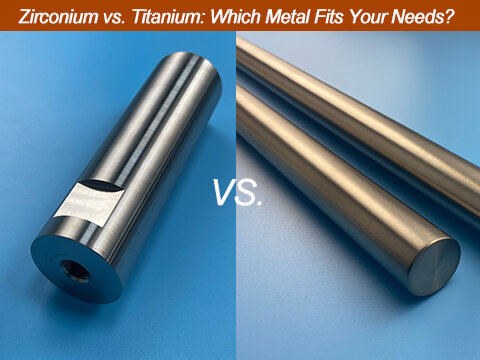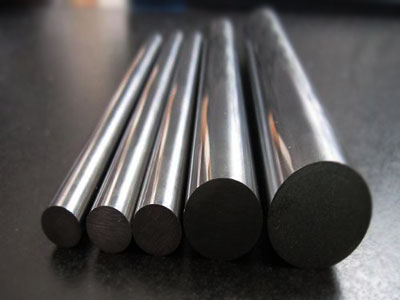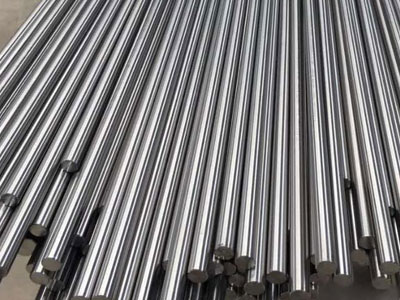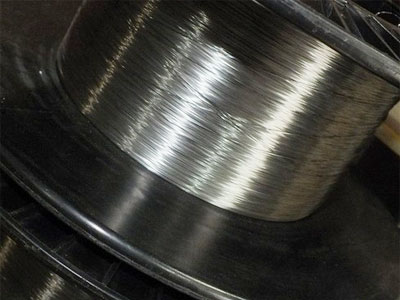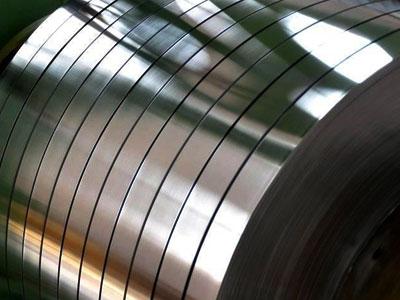Imagine choosing between two incredibly strong, heat-resistant, and corrosion-resistant metals. That's the dilemma when deciding between zirconium and titanium. Both are fantastic materials, but they have unique qualities that make them better suited for different jobs.
Zirconium is like a sturdy, heat-resistant shield. It's great for things like nuclear reactors and chemical processing because it can handle harsh conditions. Plus, it's hypoallergenic, so it's perfect for jewelry and medical implants.
Titanium is like a lightweight superhero. It's strong but doesn't weigh a lot, making it ideal for airplanes, spaceships, and sports equipment. It's also biocompatible, so it's used in medical implants and surgical tools.
Picking the right one depends on what you need. Do you need something super strong and heat-resistant? Zirconium might be your best bet. Need something lightweight and biocompatible? Titanium is the way to go.
In this article, we will explore the core differences between these two materials, comparing their properties, applications, and other key factors to help you determine which one is the best fit for your project.
Key Properties and Characteristics
Zirconium: A Versatile Metal
-
Strength and Durability: Zirconium is a strong and durable metal, capable of withstanding significant mechanical stress without deformation. This makes it suitable for applications where structural integrity is essential.
-
Corrosion Resistance: Zirconium is highly resistant to corrosion, even in aggressive environments such as seawater, acids, and alkalis. This property is due to the formation of a protective oxide film on its surface.
-
Heat Resistance: Zirconium has a high melting point and can withstand extreme temperatures without losing its structural integrity. This makes it an ideal material for applications in high-temperature environments, such as nuclear reactors and chemical processing.
-
Neutron Absorption Properties: Zirconium has a low neutron absorption cross-section, making it a suitable material for use in nuclear reactors. It can effectively slow down neutrons without absorbing too many, which is essential for maintaining a controlled nuclear chain reaction.
-
Allergen-Free: Zirconium is hypoallergenic, meaning it is unlikely to cause allergic reactions in people. This makes it a safe and suitable material for jewelry and medical implants.
Titanium: A Lightweight and Strong Metal
-
Lightweight: Titanium is a relatively lightweight metal, compared to other metals with similar strength properties. This makes it an ideal material for applications where weight reduction is important, such as aerospace and aviation.
-
High Strength-to-Weight Ratio: Titanium has a high strength-to-weight ratio, meaning it is incredibly strong for its weight. This makes it a valuable material for applications where both strength and weight are critical factors.
-
Biocompatibility: Titanium is biocompatible, meaning it is compatible with the human body. This makes it a safe and effective material for medical implants and surgical tools.
-
Corrosion Resistance: Titanium is highly resistant to corrosion, even in harsh environments. This is due to the formation of a protective oxide layer on its surface.
-
Heat Resistance: Titanium has a high melting point and can withstand extreme temperatures without losing its structural integrity. This makes it a suitable material for high-temperature applications, such as aerospace components and industrial furnaces.
Comparing Zirconium and Titanium: Key Factors
Corrosion Resistance
Both zirconium and titanium are known for their impressive resistance to corrosion, making them ideal for many applications. However, zirconium stands out as the champion when it comes to withstanding extremely acidic and corrosive environments.
Strength and Durability
Zirconium is a sturdy, durable metal that can handle significant stress without bending or breaking. Titanium, on the other hand, is renowned for its incredible strength-to-weight ratio, making it perfect for applications where lightweight materials are essential.
Temperature Resistance
Both metals excel in high-temperature environments. Zirconium is particularly well-suited for extreme conditions, often used in nuclear reactors and chemical processing. Titanium, while also heat-resistant, is commonly found in aerospace and aviation applications.
Cost Considerations
Zirconium, due to its specialized uses and limited availability, tends to be more expensive than titanium. Titanium, being more widely used, is generally more affordable.
Applications and Uses
Zirconium Metal Applications
Nuclear Reactors:
Zirconium's exceptional corrosion resistance and neutron absorption properties make it a crucial component in nuclear reactors. It's used to fabricate fuel cladding tubes and control rods, ensuring the safe and efficient operation of these power plants.
Chemical Processing:
Zirconium's ability to withstand harsh chemicals and high temperatures makes it a valuable material in the chemical industry. It's used in equipment like heat exchangers, pumps, and valves, ensuring efficient and reliable processes.
Electronics:
Zirconium's high melting point and electrical conductivity make it suitable for various electronic components, including capacitors and resistors. It helps improve the performance and durability of these devices.
Jewelry:
Zirconium's hypoallergenic properties and lustrous appearance make it a popular choice for jewelry. It offers a stylish and affordable alternative to precious metals like platinum and palladium.
Medical Implants:
Zirconium's biocompatibility and corrosion resistance make it a safe and effective material for medical implants. It's used in dental implants, hip and knee replacements, and spinal implants, providing long-lasting and reliable solutions.
To learn more about the application of zirconium, check out our blog post on [Discover the Diverse Uses of Zirconium: From Ceramics to Nuclear Reactors]
Titanium Metal Applications
Aerospace and Aviation:
Titanium's lightweight and high strength-to-weight ratio make it an essential material in the aerospace and aviation industries. It's used to construct aircraft components such as engine parts, landing gear, and fuselage panels, ensuring safety and efficiency.
Medical Implants:
Titanium's biocompatibility and corrosion resistance make it a popular choice for medical implants. It's used to create artificial joints, dental implants, and spinal implants, providing patients with durable and comfortable solutions.
Sporting Goods:
Titanium's strength and lightweight properties make it ideal for sporting equipment. It's used in golf clubs, bicycle frames, and tennis rackets, enhancing performance and durability.
Industrial Components:
Titanium's versatility extends to various industrial applications. It's used in chemical processing, marine engineering, and oil and gas exploration, providing corrosion-resistant and durable components.
Jewelry:
Titanium's unique properties and modern aesthetic make it a popular choice for jewelry. It offers a lightweight, durable, and hypoallergenic alternative to traditional metals.
To learn more about the application of titanium, check out our blog post on [Discover the Uses of Titanium: A Versatile Wonder Metal].
Choosing the Right Material
When selecting between zirconium and titanium for your application, it's essential to consider several key factors:
-
Application: Assess the specific conditions your material will face. If the environment is highly corrosive, zirconium may be the better choice due to its exceptional resistance. If high-stress conditions are expected, titanium's superior strength-to-weight ratio can be advantageous.
-
Budget Constraints: Evaluate your budget to determine which material aligns with your financial limitations. While zirconium may have a higher initial cost, its long-term durability and performance can offset this in certain applications.
-
Long-Term Performance Needs: Consider the expected lifespan and performance requirements of your application.
-
Environmental Impact: Consider the environmental implications of using zirconium or titanium, including their extraction, processing, and disposal. For projects dealing with constant exposure to chemicals, zirconium’s long-term durability can save you money on maintenance and replacements. If weight and strength are more important, like in aerospace, titanium’s durability and light weight make it a better option for long-term use.
By carefully considering these factors, you can make an informed decision about which material is best suited for your needs.
Conclusion
Both zirconium and titanium are refractory metals with unique properties that make them suitable for a wide range of applications. While they share similarities in terms of corrosion resistance and heat resistance, they have distinct characteristics that make them ideal for different use cases.
Zirconium is particularly well-suited for applications requiring exceptional corrosion resistance, high temperature tolerance, and neutron absorption properties. It is often used in nuclear reactors, chemical processing, and medical implants.Titanium, on the other hand, is known for its lightweight, high strength-to-weight ratio, and biocompatibility. It is commonly used in aerospace, medical implants, sporting goods, and industrial components.
By understanding the key differences between zirconium and titanium, you can make an informed decision about which material is best suited for your specific needs. It is recommended to consult with experts or engineers to ensure that you select the optimal material for your application.
Contact us today to discuss your specific project requirements and explore our comprehensive range of zirconium and titanium products.

